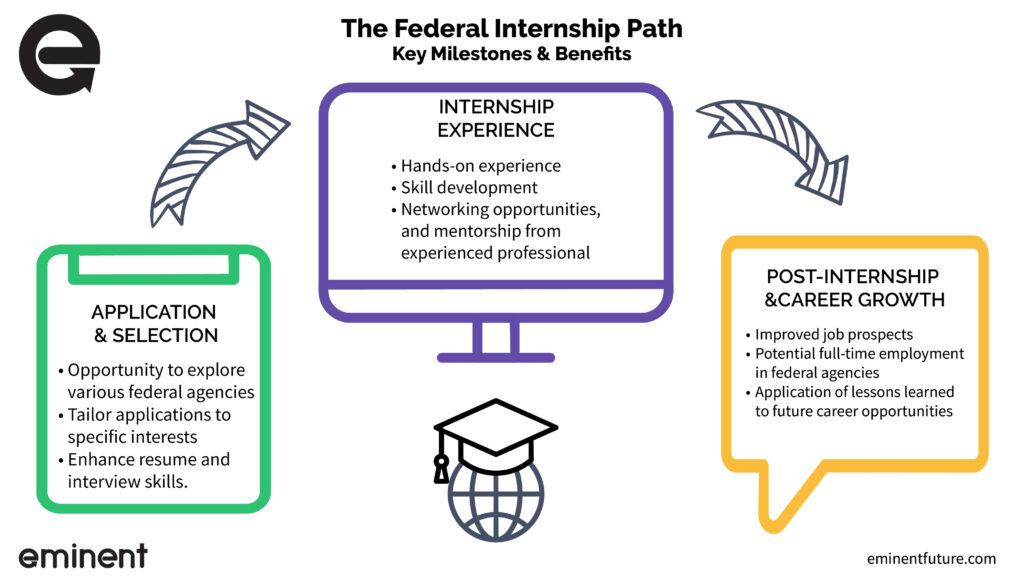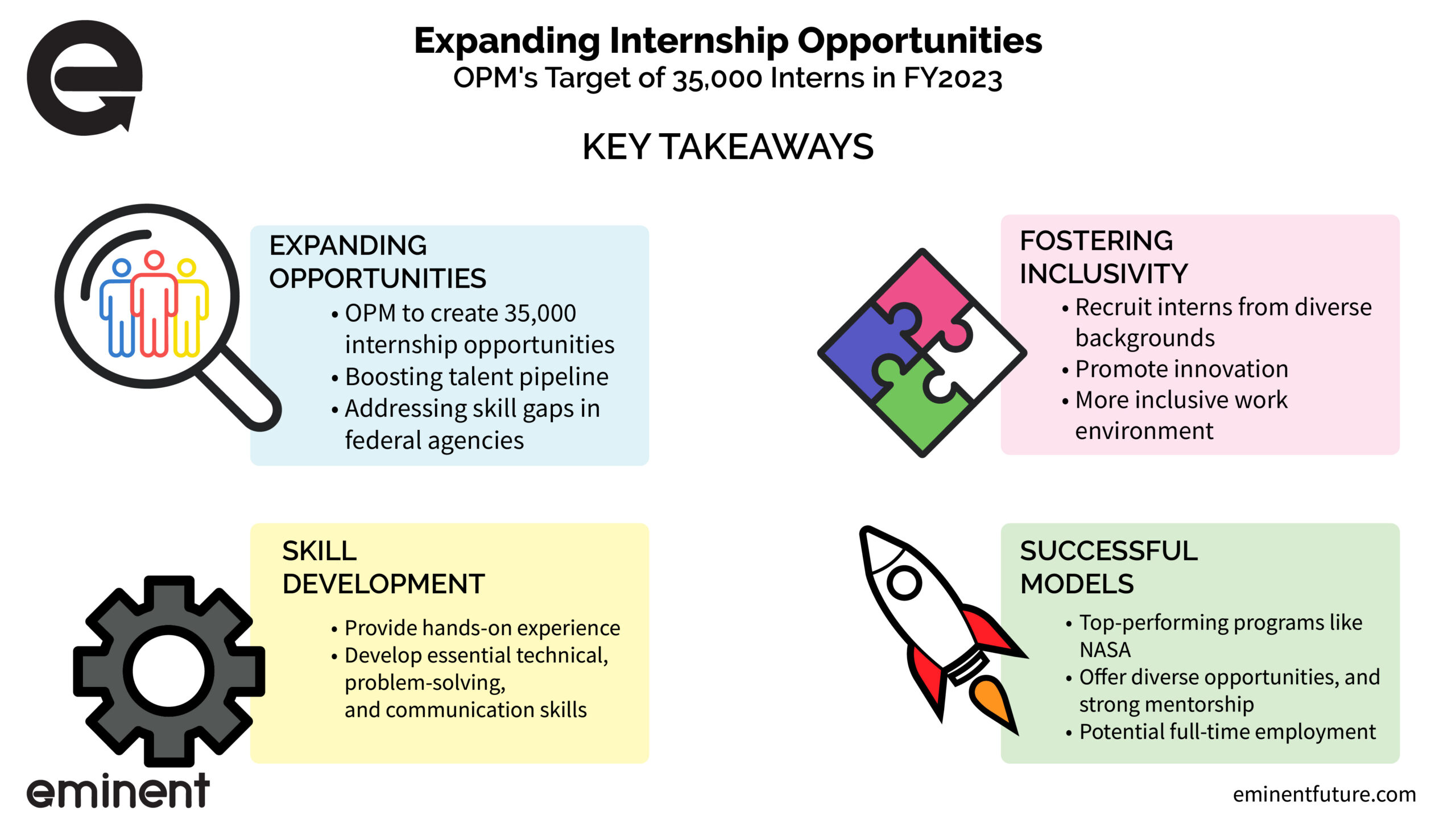OPM’s Target of 35,000 Interns in FY2023

The Office of Personnel Management (OPM) recently unveiled new guidance to boost internships in federal agencies. By targeting 35,000 interns in FY2023, OPM emphasizes the vital role internships play in skill development, talent pipeline growth, and workforce inclusivity.
In this article, we’ll explore OPM’s guidance objectives, the perks of federal sector internships, and the hurdles agencies face when implementing and expanding their internship programs. We’ll also highlight success stories, share best practices from top-performing agencies, and present an infographic showcasing internships’ impact on career growth.
- OPM’s new guidance targets 35,000 federal internships in FY2023, emphasizing skill development, talent pipeline growth, and workforce diversity.
- The guidance outlines key objectives and strategies to increase internship opportunities, streamline the application process, and promote inclusivity.
- Federal internships offer numerous benefits, including hands-on experience, networking opportunities, and fostering diversity in the workforce.
- Successful programs like NASA’s Internship serve as a model for best practices, focusing on diverse opportunities, strong mentorship, and potential full-time employment.
Guidance to Boost Internships

The guidance revolves around three core components:
- Setting clear objectives for internships.
- Outlining strategies to increase the number of opportunities.
- Discussing the expected impact on federal agencies.
Now, let’s explore each of these areas in more detail.
Key Objectives
OPM’s new guidance focuses on several key objectives to strengthen federal internships. The primary goal is to increase internship opportunities by setting a target of 35,000 interns for FY2023.
This initiative also aims to streamline the application and onboarding process for interns, ensuring a smooth and efficient experience. Lastly, the guidance seeks to promote diversity and inclusion by encouraging agencies to recruit interns from various backgrounds and skill sets.
Strategies for Increasing Internships
Several strategies for federal agencies are recommended to reach the target of 35,000 interns. First, agencies should invest in marketing and outreach efforts to raise awareness about their internship programs among potential candidates.
Additionally, agencies must collaborate with educational institutions and organizations to create a robust network for intern recruitment. The guidance also suggests leveraging technology to improve the application process, making it more user-friendly and accessible for candidates.
Finally, agencies should establish clear goals and performance metrics to measure the success of their internship programs and make data-driven improvements.
Impact on Federal Agencies
Experts anticipate that the new guidance will significantly impact federal agencies. By increasing internship opportunities, agencies can tap into a diverse talent pool, helping them address skill gaps and bolster their workforce.
Interns also bring fresh perspectives and innovative ideas that can enhance agency performance. Moreover, successful internship programs can serve as a valuable tool for employee retention. Interns with a positive experience are more likely to pursue long-term careers within the agency, contributing to a more stable and skilled workforce.
Guidance to Boost Internships

Before delving into the specific benefits of internships in the federal sector, let’s briefly summarize the main advantages.
- Skill Development: Internships offer hands-on experience, helping interns develop essential technical, problem-solving, and communication skills.
- Talent Pipeline: Federal agencies can identify and nurture promising candidates, building a strong talent pipeline that leads to skilled, full-time professionals.
- Diversity and Inclusion: Actively recruiting interns from various backgrounds fosters innovation, improves problem-solving, and creates a more inclusive work environment
Interns also bring fresh perspectives and innovative ideas that can enhance agency performance. Moreover, successful internship programs can serve as a valuable tool for employee retention. Interns with a positive experience are more likely to pursue long-term careers within the agency, contributing to a more stable and skilled workforce.
Skill Development for Interns
Federal sector internships offer interns a unique opportunity to gain hands-on experience and develop essential skills. By working on real-world projects and collaborating with experienced professionals, interns can improve their technical, problem-solving, and communication abilities.
This practical experience enhances their job prospects and prepares them for future career challenges.
Talent Pipeline for Federal Agencies
Federal internships are critical in building a solid talent pipeline for agencies. By offering internships, agencies can identify and nurture promising candidates, some of whom may eventually become full-time employees.
This approach allows agencies to fill critical positions with skilled professionals already familiar with their work environment and culture, reducing onboarding time and increasing productivity.
Promoting Diversity and Inclusion in the Workforce
Internships offer federal agencies an excellent opportunity to promote diversity and inclusion in their workforce. Agencies can benefit from multiple perspectives and experiences by recruiting interns from various backgrounds.
This diversity fosters innovation, improves problem-solving, and creates a more inclusive work environment that reflects the diverse population they serve.

Overcoming Challenges in Implementing the Internship Program
In this section, we’ll explore common challenges federal agencies face when implementing internship programs: ensuring quality experiences, addressing budgetary constraints, and balancing remote and in-person internships. Let’s examine each challenge and potential solutions.
Ensuring Quality Intern Experiences
To overcome challenges in ensuring quality intern experiences, federal agencies should focus on providing a well-structured program with clear expectations and goals. To accomplish this, it helps offer diverse projects that align with interns’ interests and career aspirations and provides strong mentorship and support throughout the internship. Regular feedback sessions and opportunities for professional development can also contribute to a positive and rewarding experience for interns.
Addressing Budgetary Constraints
Budgetary constraints can be a significant hurdle for agencies looking to expand their internship programs. To address this, agencies can explore alternative funding sources, such as grants or partnerships with educational institutions and private sector organizations. Additionally, by focusing on high-impact projects that deliver value and contribute to their mission, agencies can optimize their internship programs and ensure the effective use of limited resources.
Balancing Remote and In-Person Internships
With the increasing prevalence of remote work, agencies must find a balance between remote and in-person internships to accommodate different preferences and circumstances. Achieving this balance involves creating a flexible work environment that supports remote and in-person interns, guaranteeing access to the resources, support, and opportunities necessary for all interns to succeed.
Clear communication and collaboration tools are crucial to maintaining engagement and productivity among remote interns while fostering a sense of connection with their in-person counterparts.
Success Stories and Best Practices

The NASA Internship Program is a notable example of a successful federal internship program. Let’s explore what about this federal internship makes it so successful.
NASA's High-Flying Interns
The NASA Internship is a highly competitive program that has achieved success for several reasons:
- Variety of Opportunities: Interns can work on diverse projects across engineering, science, and business, allowing them to learn new skills and explore their interests.
- Mentorship and Support: Interns receive guidance from mentors and have access to various resources, such as training and development opportunities.
- Collaboration with Experts: Interns can work with world-renowned experts, offering valuable learning experience and networking opportunities.
- Potential Full-Time Employment: Many interns secure full-time positions at NASA after completing their internships, making it an attractive option for those seeking a career in the space industry.
The NASA Internship Program has surpassed Google as one of the most competitive internships in the United States, reflecting its high quality and reputation.
Lessons Learned and Best Practices
Drawing from successful programs like NASA’s, federal agencies can adopt the following best practices for their internship programs:
- Offer Diverse Opportunities: Ensure interns have various projects and tasks catering to different interests and skill sets.
- Provide Strong Mentorship: Pair interns with experienced professionals who can offer guidance, support, and advice throughout the internship.
- Upward Movement: Provide a clear path to rewarding employment for talented interns.
Key Takeaways

Final Thoughts
In conclusion, the new guidance from OPM highlights the importance of internships in the federal sector, aiming to create 35,000 internship opportunities in FY2023. By offering internships, federal agencies can foster skill development, build a robust talent pipeline, and promote diversity and inclusion in their workforce.
As we’ve seen from the success of the NASA Internship Program, providing diverse opportunities, strong mentorship, and the potential for full-time employment can lead to exceptional internship experiences. The more federal agencies adopt best practices from successful internship programs and invest in the growth of their interns, the more the benefits of these experiences will become apparent.
Robust federal internship programs will better equip interns for their future careers, and federal agencies will gain access to a more skilled and diverse pool of talent. The OPM guidance is a significant step towards strengthening the federal workforce and shaping the future leaders of our nation.



